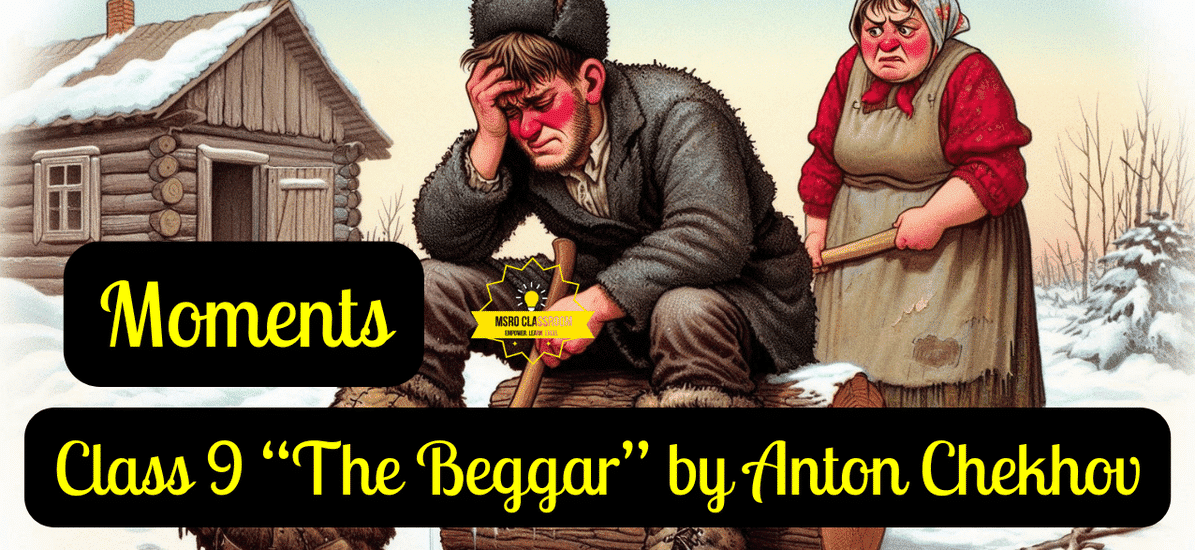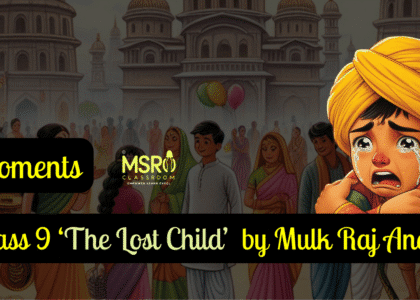Chapter 8, Anton Chekhov’s ‘The Beggar’ Summary, Theme, Word Meanings, Important Passages, Character Sketch, Questions Answers and Extra Questions.
Chapter 8- ‘The Beggar’ by Anton Chekhov
Table of Contents
From Beehive: Class 9- PROSE, Class 9- POETRY
Vocabulary:
Word Meanings and Notable Expressions:
| Abolished – Ended or done away with. Billet – A thick piece of wood. Calumny – False and harmful statements about someone. Copecks – Small Russian coins. Compassion – Sympathy and kindness toward others. Consent – Agreement or willingness to do something. Disgust – A strong feeling of dislike. Embarrassed – Feeling shy or awkward. Feeble – Weak or lacking strength. Flushed – Face turning red from emotion. Gait – The way a person walks. Godson – A boy for whom someone acts as a religious guardian. Gloomy – Dark, sad, or depressing. Idleness – A state of doing nothing. Indebted – Owing gratitude or thanks. Intrigues – Secret plans or tricks. Jeered – Mocked or laughed at someone in a rude way. Lodging – A place to stay or live. Mendicant – A beggar. Menial – Simple, low-status work. Obliged – Forced or required to do something. Perplexity – A state of confusion. Pretence – Acting falsely. Pseudo – Fake or false. Rouble – Russian currency. Scarecrow – Something thin and ragged, like a figure used to scare birds. Sealskin – Fur from a seal used for clothing. Shrugged – Lifted shoulders to show doubt or not caring. Sot – A habitual drunkard. Squalid – Extremely dirty or unpleasant. Suppliant – A person asking for something humbly. Tattered – Torn and ragged. Timidly – In a shy or nervous way. Waif – A homeless, neglected person. Wrathfully – With great anger. Notable Expressions: Fall a victim to calumny – To suffer because of false accusations or slander. Have done with lying – Stop telling lies. Taken aback – Surprised. A change took place in my heart – A deep emotional or moral transformation. Set me right – Guided someone to the correct path or way of living. To sink into the ground – To feel extreme shame or embarrassment. A push along the right path – Help or encouragement to make better life choices. Chop wood (metaphorically used) – Perform hard or humble work to earn a living. What a roasting I gave you – To firmly scold or criticise someone. Sinking into the ground – Feeling extreme embarrassment or humiliation. Did not feel the slightest inclination for toil – Had no desire to work. Glared wrathfully – Looked at someone with great anger. Scarecrow of a beggar – A beggar who looks extremely ragged and thin. Sitting without bread – Living in extreme poverty or hunger. Lost my place through intrigues – Lost a job due to conspiracies or manipulations by others. |
Summary ‘The Beggar’ by Anton Chekhov:
“The Beggar” by Anton Chekhov is about a poor man, Lushkoff, who begs for money by telling lies. He meets Sergei, a lawyer, who catches him lying and offers him work instead of cash. Lushkoff reluctantly agrees to chop wood but is weak and unwilling to work. Sergei’s cook, Olga, secretly helps him by doing his work.
Over time, Lushkoff finds small jobs and eventually changes his life. Two years later, Sergei meets him again and learns that Lushkoff has become a notary. Lushkoff thanks Sergei but reveals that Olga’s kindness and hard work changed him. The story teaches the importance of compassion, honesty, and helping others in meaningful ways.
Character Sketch ‘The Beggar’ by Anton Chekhov:
Character Sketch of Lushkoff:
1. Introduction:
- Lushkoff is a poor beggar who survives by deceiving people.
- He lies about his past to gain sympathy and money.
- His life takes a turn when he meets Sergei, an advocate.
2. Physical Appearance:
- A ragged man in a worn-out, fawn-coloured overcoat.
- Weak and feeble due to excessive drinking.
- His face has red patches, showing signs of alcoholism.
3. Character Attributes:
A. Negative Traits (At the Beginning)
- Dishonest – Lies about being a schoolteacher and a student.
- Lazy – Shows no genuine interest in working.
- Addicted to Alcohol – His health is weak due to drinking.
- Hopeless – Has no motivation to improve his life.
B. Transformation Phase
- Sergei forces him to work, but Olga, the cook, helps him secretly.
- He realises her kindness and starts feeling guilty.
- He slowly moves away from drinking and lying.
C. Positive Traits (At the End)
- Determined – Leaves his bad habits and works hard.
- Honest – Finds respectable work instead of begging.
- Grateful – Acknowledges the role of Olga and Sergei in his transformation.
4. Final Transformation:
- Becomes a notary and earns 35 roubles a month.
- Gains self-respect and independence.
- He credits Olga for his change, as her silent help and emotional scolding made him rethink his life.
Lushkoff’s journey from a dishonest beggar to a responsible man highlights the power of kindness and guidance.
His character teaches that anyone can improve with the right motivation and support.
Character Sketch of Sergei:
1. Introduction:
- Sergei is an advocate (lawyer) who meets Lushkoff, a beggar.
- He is observant and quickly recognises Lushkoff’s dishonesty.
- Instead of giving alms, he believes in teaching the value of hard work.
- No specific physical description is given in the story.
- He is portrayed as a well-off, responsible man with a strong sense of justice.
2. Character Attributes:
A. Strong Moral Values:
- Honest – He hates deception and confronts Lushkoff’s lies.
- Just – Believes people should earn money through hard work, not begging.
B. Strict but Fair:
- Sharp-minded – Quickly catches Lushkoff lying about his past.
- Short-tempered – Gets angry when he realises he was deceived.
- Strict but Kind – Though harsh initially, he still gives Lushkoff a chance to work.
C. Generous and Supportive:
- Encouraging – Gives Lushkoff multiple opportunities to work.
- Compassionate – Feels guilty for making a weak man do hard labour.
- Helpful – Later offers Lushkoff a cleaner job as a copywriter.
3. Role in Lushkoff’s Transformation:
- Initially, he forces Lushkoff to work, making him realise his mistakes.
- Indirectly helps Lushkoff change by introducing him to honest labour.
- He believes he is responsible for Lushkoff’s success, though it was Olga who truly helped.
Sergei represents the principle of tough love—helping someone through discipline rather than sympathy.
His character teaches that strictness combined with kindness can lead to real change in a person’s life.
Textbook Questions Answers ‘The Beggar’:
Q1: Has Lushkoff become a beggar by circumstance or by choice?
A1: Lushkoff became a beggar by both circumstance and choice. He was once a singer in a Russian choir but was dismissed for drunkenness. Losing his job made his situation difficult, but he begged and deceived people instead of trying to find honest work.
His alcohol addiction made him weak and unwilling to do physical labour. While his circumstances were unfortunate, he still had the choice to change, but he did not make an effort until later in the story.
Q2: What reasons does he give to Sergei for his telling lies?
A2: Lushkoff tells Sergei he lies because he has no other way to survive. He says that if he tells people the truth—that he was fired for drunkenness—no one will help him. He believes that people only give money out of sympathy, so he invents sad stories about being a student or a teacher to gain pity.
His dishonesty is not because he enjoys lying but because he feels it is the only way to get food and shelter. However, this changes later when Olga’s kindness helps him find a better path in life.
Q3: Is Lushkoff a willing worker? Why, then, does he agree to chop wood for Sergei?
A3: No, Lushkoff is not a willing worker. He is weak, unhealthy, and unwilling to do hard labour because of his drinking habit. When Sergei offers him work, he does not accept it because he genuinely wants to work. Instead, he agrees out of shame and pride—he does not want to be caught lying again.
He feels trapped by his words and does not want to refuse in front of Sergei. However, he does minimal wood chopping because Olga, the cook, secretly does it for him.
Q4: Sergei says, “I am happy that my words have taken effect.” Why does he say so? Is he right in saying this?
A4: Sergei says this because his strict words and scolding changed Lushkoff and encouraged him to leave begging. He thinks that by forcing Lushkoff to work, he helped him find an honest way to earn a living. However, he is only partly correct.
The real reason for Lushkoff’s change is Olga’s kindness. She did the wood chopping for him and spoke to him with sympathy and concern, which touched his heart and made him want to change. While Sergei helped, Olga’s quiet actions truly transformed Lushkoff.
Q5: Lushkoff is earning thirty-five roubles a month. How is he obliged to Sergei for this?
A5: Lushkoff is grateful to Sergei because Sergei gave him his first push toward change. If Sergei had not forced him to chop wood, Lushkoff might have continued begging and lying. Sergei also gave him a better job by introducing him to a friend who needed copying work.
This helped Lushkoff leave physical labour and start a more respectable job. Although Olga played a bigger role in his transformation, Lushkoff still respects Sergei for helping him move away from begging and toward an honest life.
Q6: During their conversation, Lushkoff reveals that Sergei’s cook, Olga, is responsible for the positive change in him. How has Olga saved Lushkoff?
A6: Olga saved Lushkoff through her kindness and silent help. While Sergei thought he was making Lushkoff work, Olga chopped the wood. She also spoke to him with deep concern, scolding him for drinking and ruining his life.
Her words and actions touched Lushkoff’s heart, making him ashamed and pushing him to change. Because of Olga’s quiet but powerful influence, he stopped drinking, found honest work, and became independent. Her compassion, rather than strictness, was what truly saved him.
Q7: How can we help beggars/abolish begging?
A7: To help beggars and reduce begging, we must focus on education, employment, and support programs. Instead of giving money, we should offer food and clothes or help them find jobs. Governments and charities can create shelters, training centres, and rehabilitation programs for beggars.
Many beggars are homeless, sick, or addicted to alcohol, so they need medical care and counselling. People can support organisations that provide free education and skills training so beggars can work and earn money honestly.
Society must also raise awareness about the reasons behind begging, such as poverty and unemployment. By showing kindness and offering opportunities, we can help beggars live a better life and slowly abolish begging from society.
Extra Questions ‘The Beggar’ by Anton Chekhov:
Short Answer Type Questions:
Q1: How does Sergei first recognise Lushkoff, and what does this reveal about Lushkoff’s character?
A1: Sergei recognises Lushkoff by his mismatched overshoes and remembers seeing him pretending to be a student earlier. It reveals that Lushkoff is dishonest and manipulative, using lies to gain sympathy. However, it also shows his desperation and helplessness, as he believes deception is the only way to survive.
Q2: Why does Lushkoff stop coming to Sergei’s house after receiving the letter for a new job?
A2: Lushkoff stops coming to Sergei’s house because he gets a stable job as a notary’s assistant. The job allows him to earn honestly without physical labour. More importantly, he has changed, no longer begging or relying on others, thanks to Olga’s kindness and Sergei’s initial push.
Q3: How does Lushkoff’s appearance change when Sergei meets him at the theatre? What does this suggest about his transformation?
A3: When Sergei meets Lushkoff at the theatre, he looks respectable, wearing a coat with a fur collar and a sealskin cap. His transformation suggests his change from a beggar to an independent man. He now earns honestly, is sober, and has regained his dignity, proving that true change is possible.
Q4: Why does Olga scold Lushkoff while secretly helping him? How does this affect him emotionally?
A4: Olga scolds Lushkoff to make him ashamed of his condition, hoping he will change. However, she secretly chops the wood for him, showing kindness and compassion. Her words and actions deeply touch Lushkoff’s heart, making him realise his mistakes. Emotionally moved, he decides to stop drinking and change his life.
Q5: What lesson does “The Beggar” teach about kindness and true change?
A5: “The Beggar” teaches that true change comes from kindness, not harshness. While Sergei scolds Lushkoff, Olga’s silent help and compassion transform him. The story shows that understanding and support can inspire people to improve their lives, proving that gentle care is more potent than strict punishment.
Q6: What was Olga’s role in Lushkoff’s transformation?
A6: Olga’s scolding and hidden kindness changed Lushkoff. Though she rebuked him harshly, she secretly chopped wood for him, showing genuine care. Her tears and concern made him feel ashamed and motivated him to quit drinking and work honestly, leading to his transformation into a respectable man.
Q7: Why Did Lushkoff Stop Coming to Sergei’s House for Work?
A7: Lushkoff stopped coming because Sergei helped him get a better notary assistant job. This job provided him stability and dignity, allowing him to earn without begging or doing hard labour. More importantly, he had changed, no longer needing charity or assistance to survive.
Q8: Why did Lushkoff stop coming to Sergei’s house for work?
A8: Lushkoff stopped coming because Sergei helped him find a better notary assistant job, offering a stable income and dignity. More importantly, with Olga’s kindness and support, he became an honest man, no longer needing charity or small labour jobs to survive.
Q9: How did Lushkoff’s life change after meeting Sergei and Olga?
A9: After meeting Sergei and Olga, Lushkoff quit begging and drinking. Sergei gave him work and later helped him find a respectable job. However, Olga’s silent kindness and emotional impact truly transformed him. He became self-reliant and honest, earning thirty-five roubles a month as a notary.
Q10: Why was Sergei surprised when he met Lushkoff at the theatre?
A10: Sergei was surprised because Lushkoff, once a beggar and drunkard, now looked respectable and independent. He had become a notary earning thirty-five roubles a month. Sergei believed his scolding changed Lushkoff but later realised that Olga’s kindness was the valid reason for his transformation.
Q11: How did Lushkoff feel about Olga’s actions, and why?
A11: Lushkoff felt deeply grateful for Olga’s actions. Though she scolded him, her hidden kindness and silent sacrifice touched his heart. Seeing her chop wood for him made him ashamed of his laziness, inspiring him to change his ways, quit drinking, and become a hardworking, honest man.
Q12: Why did Sergei believe he had changed Lushkoff’s life?
A12: Sergei believed he changed Lushkoff’s life because he gave him work, scolded him for lying, and later helped him get a stable job. He thought his harsh words and discipline had motivated Lushkoff to change. However, he later learned that Olga’s kindness was the valid reason for Lushkoff’s transformation.
Q13: What does The Beggar tell us about the importance of second chances?
A13: The Beggar highlights that everyone deserves a second chance. Lushkoff, once a dishonest beggar, transformed into a respectable man because Sergei and Olga gave him work, kindness, and support. It shows that guidance, patience, and compassion can help people overcome past mistakes and create a better future.
Long Answer Type Questions:
Q1: How does Sergei’s attitude toward Lushkoff change from the beginning to the end of the story? What causes this shift?
A1: Sergei first sees Lushkoff as a dishonest beggar and feels angry when he catches him lying. He forces Lushkoff to work, believing that hard labour will change him. Over time, Sergei notices improvement in Lushkoff and is pleased when he finds a respectable job.
However, at the theatre, he learns that Olga’s kindness, not his efforts, truly transformed Lushkoff. This surprises him and makes him realise that compassion is more powerful than harshness.
By the end, he is happy for Lushkoff and takes pride in his small role in his success, even though Olga is the real reason for the change.
Q2: Why does Lushkoff initially lie about his past, and how does Sergei react when he catches him?
A2: Lushkoff lies because he believes no one will help him if he tells the truth. He wants sympathy, so he pretends to be a teacher who lost his job unfairly. When Sergei recognises him from a previous lie, he becomes angry and calls him a dishonest swindler.
Sergei threatens to call the police, forcing Lushkoff to admit the truth—that he was a choir singer who lost his job due to drunkenness. Instead of punishing him, Sergei offers him work as a woodcutter.
Though Lushkoff is not eager to work, he agrees out of shame and pride. This moment marks the beginning of his transformation from a beggar to a hardworking man.
Q3: Why does Olga’s approach to helping Lushkoff work better than Sergei’s? What does this say about human nature?
A3: Sergei believes that harsh words and forced labour will change Lushkoff. He scolds and gives him work, thinking this will teach him responsibility. However, Lushkoff does not chop the wood—Olga secretly does it for him.
She scolds him, cries for him, and shows concern, which touches his heart. Her compassion and silence help him feel guilty and ashamed, motivating him to transform. This demonstrates that compassion holds more power than consequences.
People are likelier to improve when they feel understood and cared for rather than shamed or forced. Olga’s empathy helps Lushkoff regain self-respect and find a better life.
Q4: How does the story show the impact of kindness versus harshness in transforming a person’s life?
A4: The story contrasts Sergei’s strict approach with Olga’s kindness to show what changes people. Sergei believes that hard work will teach Lushkoff responsibility. He forces him to chop wood, which does not directly change him.
On the other hand, Olga helps him in secret, showing compassion and care. Her words and actions make Lushkoff realise that someone believes in him. Because of her kindness, he stops drinking, finds work, and transforms his life.
The story teaches that people change when treated with compassion and understanding rather than harshness. Love and care inspire true transformation, while anger and punishment often fail to bring lasting change.
Q5: What themes of honesty and redemption are explored in The Beggar? How does Lushkoff’s journey reflect these themes?
A5: The story highlights honesty and redemption through Lushkoff’s transformation. At first, he lies to get money, pretending to be a schoolteacher or student. When Sergei catches him, he admits the truth but does not immediately change.
However, through Olga’s quiet help and kindness, he feels ashamed and begins to change. He stops drinking, finds honest work, and becomes a notary. This shows that people can change if given a second chance and the proper support.
Lushkoff’s journey proves that honesty leads to self-respect and that redemption is possible when someone truly wants to improve. The story teaches that kindness and patience, rather than punishment or shame., help people improve.
Q6: How does The Beggar challenge society’s perception of beggars and the reasons for their struggles?
A6: The story makes us rethink how we see beggars. Many people assume beggars are lazy and do not want to work. However, Lushkoff’s case shows that sometimes people struggle because of their past mistakes or addictions.
He was once a singer but lost his job due to drinking. Instead of judging him, Olga shows compassion, which helps him change. The story teaches that beggars are not always dishonest or unwilling to work—some just need a chance and support.
It reminds us that kindness and understanding can help people rebuild their lives. Instead of ignoring or punishing beggars, society should help them find jobs and a fresh start.
Q7: If Olga had not secretly helped Lushkoff, do you think he would have changed? Why or why not?
A7: Without Olga’s secret help, Lushkoff might not have changed. Sergei’s harsh words made him ashamed, but Olga’s kindness touched him. She chopped the wood for him instead of forcing him to work and showed silent compassion.
Her scolding and tears made him realise that someone cared about his condition. This emotional impact helped him quit drinking and find a better life.
If Olga had not helped, Lushkoff might have continued lying and begging. He needed support, not punishment, to change. The story shows genuine care is often more potent than strict discipline in changing people’s lives.
Q8: What does Lushkoff’s transformation suggest about the role of compassion in changing a person’s life?
A8: Lushkoff’s story shows that compassion can bring real change. At first, he lies and begs because he sees no other way to survive. Sergei scolds him, but Olga’s kindness truly affects him.
Even though she criticises him, she also secretly helps him, showing that love and care are stronger than punishment. Her silent support gives him the strength to stop drinking and start working honestly. It suggests that people change not because of force but because someone believes in them.
Compassion restores self-respect and motivates people to improve their lives. The story teaches that understanding and kindness can help even the most lost individuals find a better path.
Q7: If Olga had not secretly helped Lushkoff, do you think he would have changed? Why or why not?
A7: Without Olga’s secret help, Lushkoff might not have changed. Sergei’s harsh words made him ashamed, but Olga’s kindness touched him. She chopped the wood for him instead of forcing him to work and showed silent compassion.
Her scolding and tears made him realise that someone cared about his condition. This emotional impact helped him quit drinking and find a better life. If Olga had not helped, Lushkoff might have continued lying and begging.
To change, he needed support, not punishment. The story shows genuine care is often more important than strict discipline in changing people’s lives.
Q8: What does Lushkoff’s transformation suggest about the role of compassion in changing a person’s life?
A8: Lushkoff’s story shows that compassion can bring real change. At first, he lies and begs because he sees no other way to survive. Sergei scolds him, but Olga’s kindness truly affects him.
Even though she criticises him, she also secretly helps him, showing that love and care are stronger than punishment. Her silent support gives him the strength to stop drinking and start working honestly. It implies that individuals transform not due to pressure but because someone has faith in them.
Compassion restores self-respect and motivates people to improve their lives. The story teaches that understanding and kindness can help even the most lost individuals find a better path.
Important Passages from ‘The Beggar’ By Anton Chekov:
1. “Have done with lying! You called yourself a student and even told me what you had been expelled for. Don’t you remember?”
Context: Sergei, the advocate, recognises Lushkoff, a beggar who previously claimed to be a student. Angered by the man’s dishonesty, Sergei confronts him and forces him to admit his lies. The moment prompts Sergei to challenge Lushkoff to work instead of begging, setting the stage for his transformation.
2. “Work! That’s what you can do! You must work!”
Context: After catching Lushkoff in a lie, Sergei refuses to give him money, insisting he must work instead. He offers him a job chopping wood, believing that honest labour will reform him. Lushkoff agrees out of shame and pride, highlighting the theme of self-reliance and dignity in work. Sergei’s strict yet fair approach prompts Lushkoff to transform from a dishonest beggar to a hardworking man.
3. “Do you know, sir, that I did not chop one single stick of wood for you? She did it all.”
Context: Lushkoff reveals a shocking truth—he never chopped wood at Sergei’s house. Olga, the cook, did all the work for him, silently taking pity on him while scolding him harshly. The revelation changes the reader’s perspective on Lushkoff’s transformation. While Sergei believes he is responsible for helping him, Olga’s silent kindness and compassion have the most profound impact. It suggests that while discipline and strictness can help, actual change often comes from kindness and emotional support.
4. “Why this saved me, why I changed, why I stopped drinking at the sight of her I cannot explain.”
Context: The passage highlights the power of kindness over punishment. While Sergei provided the work opportunity, Olga’s selfless act touched Lushkoff’s heart and motivated him to turn his life around. It shows that fundamental transformation comes from external pressure and a deep, personal realisation sparked by genuine care and empathy.
5.“I am a notary now and am paid thirty-five roubles a month.”
Context: The climax represents his transformation and reinforces the story’s central message—people can change if given the proper support and motivation. However, the story also leaves an important lesson: while Sergei believes that his strict approach helped Lushkoff, Olga’s kindness genuinely changed him. The contrast between strict discipline and silent compassion is a powerful message about how different forms of help can influence a person’s life.
6. “The scarecrow of a beggar shrugged his shoulders, as if in perplexity, and went irresolutely after the cook. It was obvious from his gait that he had not consented to go and chop wood because he was hungry and wanted work, but simply from pride and shame and because he had been trapped by his own words.”
Context: Here, Lushkoff reluctantly follows Olga. His body language shows hesitation, suggesting he is unwilling to work. Instead, his decision to follow Olga is motivated by pride and shame—he does not want to openly refuse after being caught lying. The passage highlights Lushkoff’s inner conflict. He is not yet ready to change but is slowly forced toward responsibility. His weak and unhealthy state also suggests that years of drinking and deception have made him incapable of hard labour.
7. “Next he saw the pseudo-teacher seat himself on a log and become lost in thought with his red cheeks resting on his fists. The woman flung down an axe at his feet, spat angrily, and, judging from the expression of her lips, began to scold him.”
Context: Lushkoff’s behaviour suggests that he is not accustomed to honest labour, proving that his past stories about being a student or a teacher were false. Meanwhile, Olga’s frustration is evident—she throws down the axe and scolds him harshly. This passage is significant because it introduces Olga as a strong, no-nonsense character who plays a crucial role in Lushkoff’s transformation.
8. “The beggar irresolutely pulled a billet of wood towards him, set it up between his feet, and tapped it feebly with the axe. The billet wavered and fell down. The beggar again pulled it to him, blew on his freezing hands, and tapped it with his axe cautiously, as if afraid of hitting his overshoe or of cutting off his finger.”
Context: Lushkoff’s attempt at chopping wood is weak and hesitant. His delicate, careful movements show his lack of skill and physical weakness. The passage also suggests that he is more concerned about avoiding injury than doing the job. His slow, ineffective effort contrasts sharply with Olga’s anger and Sergei’s expectations. This moment is critical because it foreshadows the later revelation that Olga secretly chopped the wood for him, demonstrating her quiet kindness.
9. “Sergei’s anger had vanished and he now began to feel a little sorry and ashamed of himself for having set a spoiled, drunken, perhaps sick man to work at menial labour in the cold.”
Context: As Sergei watches Lushkoff struggle, his initial anger fades and turns into pity. He realises that Lushkoff is not just lazy but also physically weak, possibly due to years of alcoholism. Sergei’s changing emotions highlight an important theme in the story: the difference between harsh judgment and genuine understanding.
While Sergei initially saw Lushkoff as a swindler who deserved punishment, he now recognises that the man’s condition is more complex. This scene is significant because it shows Sergei’s growing compassion, even if he still believes that forcing Lushkoff to work is the best solution.
10. “On the first of the month the waif made his appearance and again earned half a rouble, although he could barely stand on his legs. From that day on he often appeared in the yard and every time work was found for him.”
Context: Despite his weakness, Lushkoff returns to work despite his poor physical condition. From here, we see that he is beginning to develop a routine, even if it is not entirely voluntary. His repeated appearances indicate that something is slowly changing within him. It also marks the beginning of his journey toward transformation, though neither Sergei nor Lushkoff fully realises the impact that Olga’s hidden kindness is having on him.





